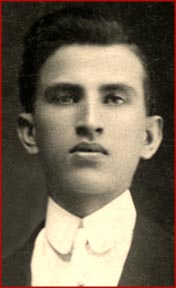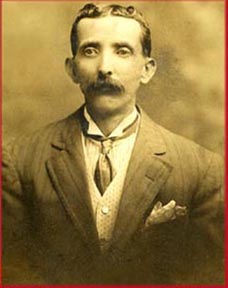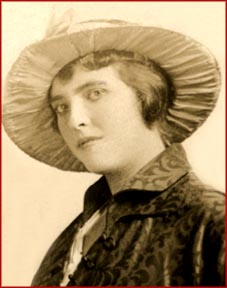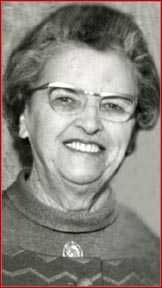


Iser (Isidor) Waxman
My mother, Bubba Beyla, she worried a lot about my brother Izzie [Iser]. He used to spent a lot of time with the Cossacks who had a camp at the lake near the inn that Bubba kept in Kalarash. Can you imagine? The Cossacks made the pogrom in Kalarash, but Izzie went with them. He loved their horses and he used to wash the horses and swim with them in the lake. Thatís why Izzie always swam just like a horse, with the upper part of his body out of the water, because he learned to swim when he was with the horses in the lake. My mother thought Izzie was becoming too friendly with the Cossacks and she was afraid that he would run away with them.
She was worried about the army too. She thought to herself, "If there is no pogrom, he'll have to go to the soldiers." You know, there they took the boys for the soldiers, when you were 21 they took you for the tsarís army and they made you into a goy [non-Jew]. By that time Izzie must have been around 16 or 17. Another couple of years, he was supposed to go already for a soldier. My parents didn't want Izzie to go for a soldier. My mother said, "Maybe youíll cut up a finger or what." Izzie said, "I'm not cutting no finger, I'm not making myself for a cripple. I'm gonna go to my father in America." My mother cried, but she agreed, she let us send him to America. Izzie wrote to our father and our father sent him a schiffeskarte, a ticket for the boat, and Izzie came to America in 1906.
So my father and my brother were in America and my mother and I were there in Kalarash. And we used to receive letters and money, a little money, my father, he should rest in peace, he used to send for me to my mother, ten dollars, five dollars, not so much now, but those years it was a lot of money.

Jacob Waxman
Then my father wrote to my mother, "I want you to let Chaika [Ida] go to America. And if you don't want to let her go herself, I'll send a ticket for you too." My mother, she didnít want to go to America. By then Bubba was married again, to Joe Einbinder. Then my father wrote again to my mother and he says, "Look, Chaika is getting older and I don't want her to stay there where today is quiet and tomorrow it could be another pogrom like it was before." And then he used to write letters to me and he says, "Why don't you come to America? Why do you have to lay in a little town like that and get lost? Here in America you'll be with people, you'll grow up to be a lady." My mother said, "No you can't go." I says, "I certainly will go and if you wouldn't let me go, I'll run away and I'll get somebody from the town and I'll write to my father that he should send a schiffeskarte for the other one too, so she'll take me along to America."
Finally Bubba Beyla agreed I should go to America. My father sent a schiffeskarte for me and one for my other father Joe. Bubba didn't go to America with us. She remained in Europe and she worked the inn, in case Joe couldnít make money in America. She says she's not giving up her business and everything and then maybe Joe wouldn't like it in America and then what is she going to do. She was a smart woman, you know. She says to Joe, "You go with Chaika. If it'll be good, I'll go and if it wouldn't be good, you'll come back to Kalarash and we'll still have the business."
So I came to America with my stepfather Joe in 1907. Me and Joe, we went first to Holland, on a German ship. Before we got to the ship, we had to pass a certain border, to go to the other side, to the Austrian side, because we were on the Russian side. So what did I do? I was only a girl, but I was very clever. I had there near the border a grandma from my father's side, his second wifeís mother. She arranged we should go over the border in a wagon and I hid under the hay.

Chaika (Ida) Waxman-Einbinder
I remember the boat that came to America, but the name of the other ship I don't remember, the one that went to [Rotterdam] Holland. On that boat was a German man, a very rich man, and he fell in love with me. "Such a beautiful child," he said. "How much do you want for her? Name your own price, I'll give you. No matter how much money you want, I'll give you for her and you'll sell her to me." My other father, Joe Einbinder, said "If you would give me the whole world you can't buy her. She's my daughter and you can't buy her." Joe watched me like a hawk, he was afraid that they shouldn't steal me. He told on the boat the captain, that's what happened, that's what the man said to me. So the captain went and he put already a guard near me, that wherever I went the guard went after me, till we came to Holland. [Note: Joe Einbinder feared that Chaika would be kidnapped by white slavers, a concern that the ship's captain apparently shared.]
From Holland, we went on the ship Puzhdom [Potsdam] to America. When we came to Castle Garden, so they wouldn't let us down, because we didn't have money to show. You gotta show money that you can come in to America and we didn't have no money. So my father Jake came to the boat and he gave money for us and he took us out from Castle Garden. That time the streetcars were right there near the port, where the boats were. And my father took us up to his house on the streetcar.
My fatherís second wife was a very sweet woman, she was wonderful. She washed my head and she combed me and she cleaned me up from the ship and she went out and she bought me a nice little dress. We had a landswoman [a woman from Kalarash] who was here, that she made sheitels, wigs. So my stepmother gave me in to her, that I should stay and learn how to make wigs. Because if she would give me in to a factory, I was too young -- I must have been about 14 or 15. I was working there quite a while. Then I saw five dollars a week, it was nothing, so I said I want to go to learn by dresses. So I was an examiner by ladies' shirtwaists at a factory on Stanton Street.

Bubba Beyla stayed alone in Europe maybe a year, maybe less than that. My father Jake and my brother Izzie already were here in America and my stepfather Joe and I came and we settled here and we liked it. We didn't want to go back already to Kalarash, where there was only dirt. Joe and I, we started to work and we made money and we sent money to Bubba and then Joe wrote to her that she should come here to America because "itís nice, everything will be alright." Bubba saw that Joe could work in America, so she sold the inn and the house in Kalarash. Joe sent money to her and a schiffeskarte and she came by herself on the boat in 1908.
Ida Waxman-Einbinder Wiesenthal (1967)